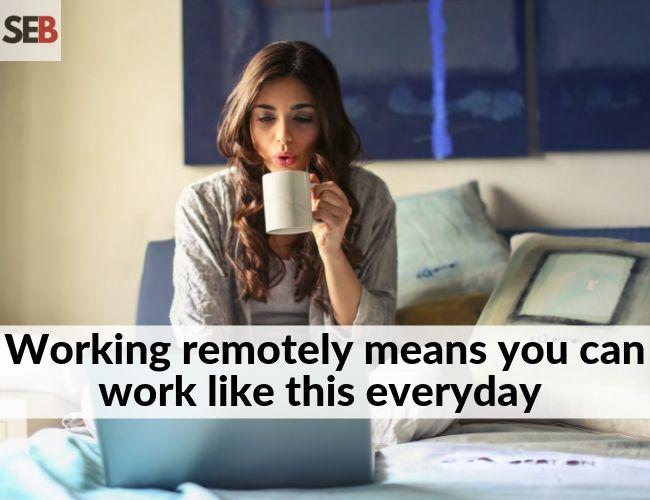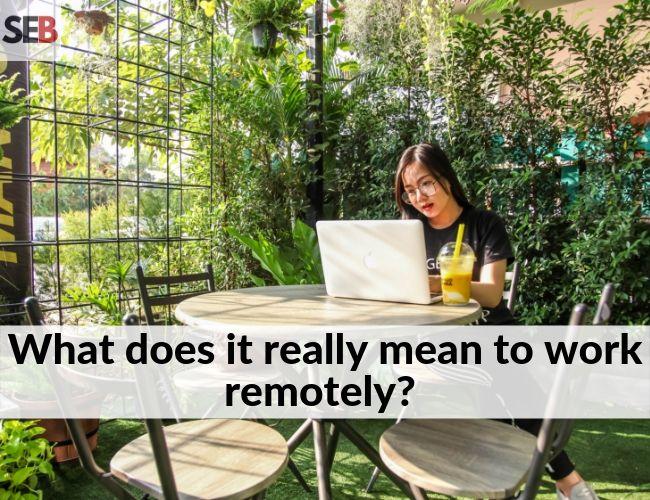For the forward-thinking company, it’s no longer a question of “What does remote work mean?” It’s now a question of, “how can we become more flexible to attract top talents?”
The workplace has changed – forever! The workplace is no longer defined by the concrete high raising walls.
Today, you can work right from your bedroom, the roadside coffee cafe down the street, or transform the beach into your new workplace.
As long as there’s internet and you can connect to the network with your devices, you can work from anywhere.
Want to Grow Your Real Estate Business? Download the Complete Grant & Funding eBook for instant access to grants, guides, and more. 80+ Grant and Scholarship Opportunities (FG, State-by-State, General & Underrepresented Groups Scholarships, Plus Grant Writing Checklist). 900+ Copies Sold Already. Get Your Copy Now
Since the turn of the millennium, there has been a growing trend, especially among companies – both large, medium, and even small ones – when it comes to their employees.
More companies are willing to allow their staff to work from any location. Some have even changed their hiring process to hire only remote workers.
And, it’s not uncommon to see companies built entirely by remote workers. These changes, of course, wouldn’t have been possible without the widespread penetration of the internet.
Welcome to the world of remote work where experts outside the traditional office space do nearly all office tasks!

What is Remote Work?
Remote work is a system which allows professionals or experts to work outside a traditional office environment.
It is based primarily on the concept that it is not necessary for work to be performed in a particular place for it to be accomplished.
Remote work is location independent. You don’t have to be in an office setting to get ‘things’ done.
Who are Remote Workers?
Remote workers take on the remote working lifestyle by executing projects from the comfort of their respective homes or coworking spaces.
They are gifted with the flexibility to plan their days without necessarily having to commute to work, as long as they meet their daily goals or tasks.
Remote work is on the rise. Many people who desire to maximize their personal and professional lives to their full potential are plugging into this lifestyle of making money without getting tied to an office.
According to an annual workforce survey released in February 2018 by Upwork, a freelance marketplace – 55% of more than 1,000 US managers who took the survey say they have hired remote workers, and that remote work is becoming more commonplace compared to just 3 years ago.
Thanks to technology, many employees can work outside of an office, thereby minimizing the stress of everyday commute or even overbearing bosses.
How Do People Work Remotely?
People work remotely in a variety of ways, and that is the main beauty of this lifestyle. You can choose to work in any way that makes the most sense for your life.
Most people work from home offices, coworking spaces or even nearby cafés and only get to work from the company’s office if it is necessary.
Coworking spaces are hubs of productivity, technology, and community, which offer excellent network connectivity as well as opportunities to meet others who work in other industries.
These coworking spaces are springing up in nearly every part of the country. Though a majority of these facilities are located in Lagos. The story is the same around the world where more and more of these hubs are set up.
They offer the perfect environment for people with full-time jobs as well as freelance careers. Even entrepreneurs are not left out as well.
So, it is all about having location flexibility, whether you choose to work from your home office or a coworking space.
You will be able to work whenever you are most creative or productive, and not be constrained to the traditional nine-to-five grind.
Remote Work and Why People Chose This Lifestyle
So, the common question is, “Why do people work remotely?” there are different reasons why some people choose to work remotely.
The most apparent are the benefits attached to working outside of an office environment.
The next section will reveal the benefits you will enjoy when you work remotely.
Benefits of Remote Work for Employees
Remote teambuilding has its perks, both for the employer and staff. Below are some of the benefits:
Flexible Lifestyle
The #1 reason why most people prefer remote work to conventional nine-to-five office drudgery is the flexible lifestyle they get to enjoy.
Remote workers can focus on whatever matters to them at any time without having to be in the office within a set time frame.
They can take time off during the day to see a dentist or be present when their kids get home from school. They can even upgrade their skillsets or certifications in their field, such as a Master’s degree, etc.
Revitalized passion for their Job
Most remote workers give their best and achieve remarkable results when working outside of a conventional office. They are usually inspired to work hard and smart by their surroundings without getting unnecessarily distracted.
They can surpass whatever goals they set for themselves and always gain new perspectives when working remotely.
Better Wellness and Health
Most remote workers possess high morale and are less stressed than in-office employees. Commuting to work every day is more than enough to stress you out coupled with the tasks you will have to tackle before the day runs out.
And since remote workers are usually happier, healthier, and less stressed or pressured, they will produce better work and show more commitment to their organizations.
Benefits of Remote Work for Employers
Of course, for organizations that are planning to encourage flexible work arrangements; they are also able to see some benefits.
Better positioned to attract and retain top talents
A 2018 ManPowerGroup Solutions survey found that 45 percent of global candidates surveyed said they preferred a work situation other than a permanent full-time job.
Today, remote work is no longer a nice to have benefit. Any employer that’s serious about attracting top talents in their industry must be ready to offer flexible work arrangement for their employees.
The survey concluded by saying “Remote work as a workforce management policy will help organizations attract and retain skilled workers.”
Higher Productivity
Remote employees tend to put in lots of extra efforts in their respective jobs, resulting in increased productivity.
The flexibility that remote workers enjoy enables them to go above and beyond to get their tasks done in comparison to their in-office counterparts.
The thing is, a remote worker understands that they are judged by the quality of work they put out; and not by how many hours they spend sitting down in an office.
Remote work is solely performance-based – Your ability to get the work done on time is what matters and not whether you clocked in at work or not.
Hence, companies tend to see increased staff productivity.
Great for the Company’s Bottom Line
A full remote company doesn’t have to worry about the cost of renting an office space. Nor monthly utility bills associated with running an office.
They are also able to save big on office furniture too. All these shelved overhead costs sure impacts the company’s bottom line.
And, the best part is, the company can channel these save money into increased marketing to grow their revenue.
Final thoughts on what does remote work mean
As remote work becomes mainstream, any company that wants to attract skilled talents must make arrangement for flexible work.

